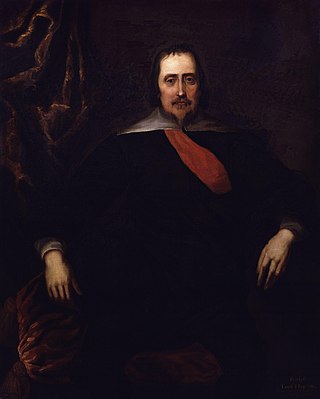Related Research Articles

William Strode was an English politician who sat in the House of Commons variously between 1624 and 1645. He was one of the Five Members whose impeachment and attempted unconstitutional arrest by King Charles I in the House of Commons in 1642 sparked the Civil War, during which he fought on the Parliamentarian side.

Sir William Waller JP was an English soldier and politician, who commanded Parliamentarian armies during the First English Civil War. Elected MP for Andover to the Long Parliament in 1640, Waller relinquished his military positions under the Self-denying Ordinance in 1645. Although deeply religious and a devout Puritan, he belonged to the moderate Presbyterian faction, who opposed the involvement of the New Model Army in politics post 1646. As a result, he was one of the Eleven Members excluded by the army in July 1647, then again by Pride's Purge in December 1648 for refusing to support the Trial of Charles I, and his subsequent execution in January 1649.

Ralph Hopton, 1st Baron Hopton was an English politician, military officer and peer. During the First English Civil War, he served as Royalist commander in the West Country, and was made Baron Hopton of Stratton in 1643.

The First English Civil War took place in England and Wales from 1642 to 1646. It is part of the 1639 to 1653 Wars of the Three Kingdoms, which also include the Bishops' Wars, the Irish Confederate Wars, the Second English Civil War, the Anglo-Scottish war (1650–1652) and the Cromwellian conquest of Ireland. Historians calculate some 15% to 20% of all adult males in England and Wales served in the military between 1639 and 1653, while around 4% of the total population died from war-related cause, versus 2.23% in World War I. These figures illustrate the impact of the conflict on society in general, and the bitterness it engendered.

Sir William Batten was an English naval officer and administrator from Somerset, who began his career as a merchant seaman, served as second-in-command of the Parliamentarian navy during the First English Civil War, then defected to the Royalists when the Second English Civil War began in 1648. After the 1660 Stuart Restoration, he was elected Member of Parliament for Rochester and re-appointed Surveyor of the Navy, a position he had previously held from 1638 to 1648. In this capacity, he was a colleague of the author Samuel Pepys, who mentions him frequently in his "Diary", often to his detriment.

Colonel John Birch was an English soldier and politician from Manchester, who fought for the Parliamentarian cause in the First English Civil War, and sat in the House of Commons at various times between 1646 and 1691.
The Committee of Both Kingdoms,, was a committee set up during the Wars of the Three Kingdoms by the Parliamentarian faction in association with representatives from the Scottish Covenanters, after they made an alliance in late 1643.
Thomas Howell (1588–1650) was a Welsh clergyman who was the Bishop of Bristol from 1644 to 1646.

Sir John Glanville the younger, was an English politician who sat in the House of Commons at various times between 1614 and 1644. He was Speaker of the English House of Commons during the Short Parliament. He supported the Royalist cause in the English Civil War.
Thomas Westfield was an English churchman, Bishop of Bristol and member of the Westminster Assembly.

Sir Alexander Carew was an English landowner, soldier and politician from Antony, Cornwall. Elected Member of Parliament for Cornwall in November 1640, he voted for the execution of the Earl of Strafford in May 1641, and supported the removal of bishops from the Church of England.

Richard Arundell, 1st Baron Arundell of Trerice of Trerice in Cornwall, was an English politician who sat in the House of Commons at various times between 1640 and 1664 when he was raised to the peerage. He fought in the Royalist army during the First English Civil War.

Sir John Stawell or Stowell, 29 August 1600 – 21 February 1662, was MP for Somerset at various times from 1625 to 1662, and one of the leading Royalists in the West Country during the First English Civil War.

Richard Herbert, 2nd Baron Herbert of Chirbury was an Anglo-Welsh Member of Parliament, a Royalist who fought with the rank of colonel in the English Civil War, and a peer whose membership of the House of Lords was curtailed by its abolition in 1649.

Sir William Savile, 3rd Baronet of Thornhill was an English politician who sat in the House of Commons between 1640 and 1642. He fought on the Royalist side in the English Civil War and was killed in action.
Sir Samuel Sandys was an English politician who sat in the House of Commons at various times between 1640 and 1685. He fought for the Royalists in the English Civil War.
Humphrey Hooke was an English politician who sat in the House of Commons from 1640 to 1642. He supported the Royalist cause in the English Civil War.
Richard Longe was an English politician who sat in the House of Commons from 1640 to 1642. He supported the Royalist cause in the English Civil War.
Sir Edward Rodney was an English politician who sat in the House of Commons at various times between 1621 and 1642.
The siege of Lyme Regis was an eight-week blockade during the First English Civil War. The port of Lyme Regis, in Dorset, was considered to be of strategic importance because of its position along the main shipping route between Bristol and the English Channel. Thomas Ceeley and Robert Blake commanded the town's Parliamentarian defences during the siege, which was laid by Prince Maurice between 20 April and 16 June 1644.